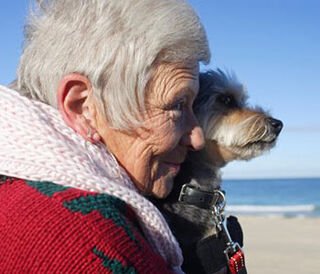Coronavirus Disease 2019
Covid-19 and the Mental Health of Seniors
Seniors have special challenges during Covid. We are not living the dream.
Posted August 24, 2020 Reviewed by Lybi Ma

I come by my expertise to speak for all stressed seniors out there with just one number—78. That’s the age I will turn in two months. Since early March, the last time I went out to a restaurant, traveled on a plane, or did something so radical as shopped in a grocery store, I’ve been living the Covid life with my husband at home. We are extraordinarily lucky and privileged. We are financially secure in a comfortable retirement; we are healthy, and our children and grandchildren are too. What’s more, we are sheltering in one of the most beautiful places on the planet, Cape Cod, where miles of pristine beaches beckon in every direction. Socially distancing here, even in the summer tourist season, can mean spying a lone beach walker through binoculars. What do I have to complain about?
Rationally, the answer is nothing. Yet, I find myself fighting off malaise and Covid Blues of the senior variety. And I am not alone. Let’s start with distance from family and friends. In the Before Times, the identity of a cosmopolitan world traveler, a geographically mobile seeker of professional advancement seemed the essence of a well-chosen life. Now, from my perch on a slim peninsula jutting into the Atlantic, I contemplate grandchildren in Chicago, an adult child and two sisters in Southern California, and long time (and aging) friends scattered around the United States and the globe. Each loved one seems hopelessly out of reach. If only we had all known that a plague would reach us and shut us up, sealed off from one another. Perhaps then we would have bought a multi-family house and all lived together in a three-generation extended family huddle. Of course not. But I do envy the families out there who, at least in my imagination, are living just that way.
But there is Zoom you say? Oh yes, I have been gazing into the screen of my laptop for hours, eyes glazing over with Zoom fatigue. And I am grateful for Zoom, FaceTime, and other platforms like it. Still, they are no substitute for physical touch and feel and smell, or even physical distance six feet apart complete with masks.
The senior variety of Covid Blues comes from the knowledge that we are the most vulnerable segment of the population, the ones with the 20 percent and plus mortality rate. We cannot comfort ourselves with notions that Covid-19 is a hoax, or just like the flu, or miraculously, a soon-to-disappear threat. We don’t feel invulnerable; we don’t party on. And we get that our very presence, our continued existence into ripe old age, as we walk among you, is a drag on the economy. Without us, the young and the healthy could be left to their own devices, getting the virus, sure, transmitting the virus, no doubt, but many asymptomatic and if sick, eventually recovering at least most of their health. The narrative we hear is that the economy would bounce back if only the productive—that’s not you, senior citizen—didn’t have to shut down to protect those vulnerable old people. I am exaggerating, I know, but sometimes it feels that ageism has taken a new ugly turn.
The senior version of Covid Blues also comes from our acute awareness of the shortness and hence, the preciousness of time. We don’t live under the illusion that we have endless amounts of it. In low moments we wonder if we will ever hug our grandchildren again. The mundane pieces of a “normal” life in the Before Times are gone—going to the movies, browsing in a crowded store, wandering through a museum, attending a play, cheering on a team playing live right in front of you. These pieces of our lives will come back, eventually. But we seniors know that the days we will have left to enjoy them have diminished, and the days remaining are unknown. The days and weeks and months lost to Covid isolation subtract from our dwindling stock of days.
Senior Covid Blues comes with a special dose of helplessness. We see the struggles of our adult children, desperately needing child care, unable to juggle remote learning with remote work and ending up just feeling remote. In the Before Times, we could fly over, drive over, or walk over and help out, taking the kids to the park, pushing the toddler in a stroller, rocking the baby to sleep. Now, in Covid times, even if we are available, we stay away.
Of course, Covid Blues senior style shares with other variations, across all age groups, similar feelings of uncertainty, helplessness, boredom, and loss. The economic devastation all around us is heartbreaking, made worse by the feeling that each citizen is on his or her own. As they say, no one is coming to save us. The brutal killing of George Floyd—not the last callous murder of an African American, we wearily acknowledge—has made visible once again, the pervasive racism that is America’s original sin. At moments, the world seems upside down and surreal; we have not yet adapted fully to the Now Times. None of this is exclusive to the gray-haired set.
The psychologist in me turns to helpful coping mechanisms. I use them. Chief among them, for me, is getting out into nature, taking long walks and here, on Cape Cod, long swims in the ocean. Trees and waves don’t transmit the virus; we can hug and touch and smell them all we want. They give us back the sensory richness we have been deprived of. Like many others, I have turned for sustenance to plants, tilling my small patch of earth, cultivating my lone tomato plant, urging it on in its struggle against powdery mildew. The comfort of pets, already well documented, is even more apparent.
And yes, I am spending inordinate amounts of time focused on food, getting it, storing it, preparing it and eating it. I am eating a lot of ice cream. I am trying to practice gratitude, focusing not on the losses, but on what I and my family and friends are so lucky to have. I sometimes succeed. I renew my determination to heed the words of John Lewis (roughly paraphrased): “When you see something wrong, you must act to do something.” I vow to act to ensure the right to vote and the right to live safe from racism.
Most of all, I am giving myself, and you, permission to feel what you feel. We are not okay, and it’s fine to say so.




